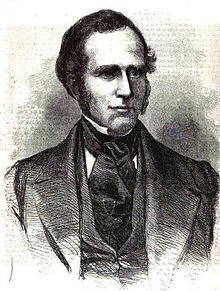- Lord Dudley Stuart
-
Lord Dudley Coutts Stuart (London, 11 January 1803 – 17 November 1854, Stockholm) was a British politician.
Stuart was the youngest son of John Stuart, 1st Marquess of Bute and Frances Coutts.
In 1820, he was admitted to Christ Church, Oxford.
On 20 July 1824, he married Princess Christine Bonaparte (d. 1847), daughter of Lucien Bonaparte, and had one son.
He was a member of the Whittington Club. He was a member of the Literary Association of the Friends of Poland as well.
A Whig and subsequently Liberal, he was a passionate advocate of Polish independence[1], and sympathetic in general to the cause of the Eastern European peoples against Russia. He received Lajos Kossuth in England after his exile from Hungary. In the election of 1857, Richard Cobden told an anecdote referring to this event:
I will tell you what happend with my knowledge -- it is no breach of confidence to say it. When that illustrious Hungarian was expected in England, after his imprisonment in Turkey, my lamented friend Lord Dudley Stuart -- whose devotion to the cause of these foreign refugees was as unbounded as it was sincere - went down to Southampton to meet Kossuth, and receive him on his arrival. Having to wait a day or two there, and being in the neighbourhood of Broadlands, where Lord Palmerston lives, he went there and saw the noble lord, and received from him a request to bring Kossuth over to Broadlands, to see him. I remember receiveing a letter from Lord Dudley Stuart, announcing to me this piece of intelligence with the greatest glee. He was delighted at the opportunity of taking Kossuth over to the Lord Palmerston; and as soon as he arrived he announced to him the pleasing information. To his astonishment he found Kossuth would not accept it. He would not go near Lord Palmerston -- (cheers); and I have got a letter from Lord Dudley Stuart, asking me to use all my influence with Kossuth to induce him to go and call upon Lord Palmerston. He would not do it; and my answer was this, "You may depend upon it, Kossuth knows a great deal more about Lord Palmerston than you do." (Laughter).[2]
A critic of the Metropolitan Police, he suggested a reduction of the strength of the force in 1853.
References
- ^ The Polish Question by R.F.Leslie (Historical Association 1964 London) page 3
- ^ “Election Intelligence,” Daily News, March 20, 1857, 3383 edition
External links
- Hansard 1803–2005: contributions in Parliament by Lord Dudley Stuart
Parliament of the United Kingdom Preceded by
Edward Lombe
John AtkinsMember of Parliament for Arundel
1830–1837
With: John Atkins 1830–1832Succeeded by
The Earl of Arundel
(representation reduced to one member 1832)Preceded by
Sir Benjamin Hall
Sir Charles NapierMember of Parliament for Marylebone
1847–1854
With: Sir Benjamin HallSucceeded by
Sir Benjamin Hall
Viscount EbringtonCategories:- 1803 births
- 1854 deaths
- Members of the United Kingdom Parliament for English constituencies
- Alumni of Christ Church, Oxford
- Younger sons of marquesses
- UK MPs 1830–1831
- UK MPs 1831–1832
- UK MPs 1832–1835
- UK MPs 1835–1837
- UK MPs 1847–1852
- UK MPs 1852–1857
- Stuart of Bute family
- United Kingdom MP stubs
Wikimedia Foundation. 2010.

